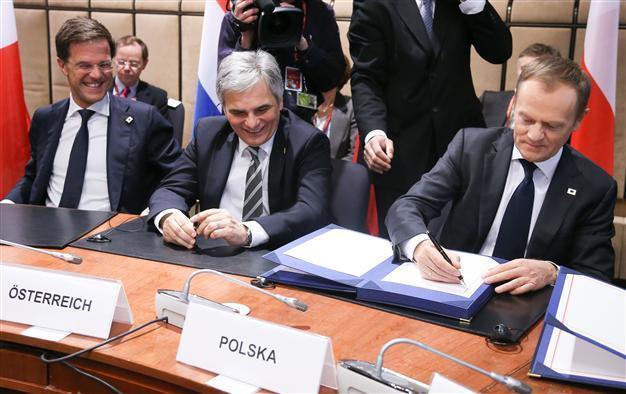EU leaders accelerate quest to reduce energy reliance on Russia
BRUSSELS - Agence France-Presse

Polish Prime Minister Donald Tusk (R) signs documents during the signing of the political provisions of the Association Agreement with Ukraine at the EU headquarters in Brussels. AFP Photo
European Union leaders on Friday discussed accelerating moving energy supplies away from Russia, saying Moscow's annexation of Crimea made them more determined to reduce dependence on Russian oil and gas.The EU has made progress in improving its energy security after gas crises in 2006 and 2009, when rows over unpaid gas bills between Kiev and Moscow led to the disruption of supplies to western Europe. However, it has not managed to reduce Russia's share of European energy supplies.
While any Russian supply outage would have less impact than before, Russia provides around one third of the EU's oil and gas. Some 40 percent of the gas is shipped through Ukraine.
"It is all about making the EU stronger as a whole versus energy exporters," Poland's Prime Minister Donald Tusk said as he arrived for the second day of the summit in Brussels where leaders dedicated the morning to energy issues.
Leaders are expected to call on the European Commission, the EU executive, to draw up detailed proposals by June on how to diversify away from Russia in the short and long term.
Europe has increased the share of renewable energy to around 15 percent and has improved infrastructure and introduced a raft of legislation, which is beginning to take effect.
Accelerated procedures, for instance, can put an end to planning battles that can drag on for years, allowing facilities for processing liquefied natural (LNG) gas shipped from all over the world to be speeded through.
Increasing reliance
Leaders are pushing for a focus on near-term solutions as well as continuance of the longer process of reducing Europe's energy dependence, which has been rising rather than falling.
EU statistics office Eurostat's energy dependence indicator, showing the extent to which EU relies on imports crept up to 65.8 percent in 2012 from 63.4 percent in 2009.
The share of Russian gas rose to around 30 percent from 22 percent in 2010, while Russia's oil imports accounted for around 35 percent of EU use.
Denmark has led a call to ask the European Commission by June to deliver a detailed plan of action and Britain has circulated its vision of longer-term measures.
Meanwhile, France and Britain are leading efforts to convince the United States to agree to export more U.S. natural gas to Europe as part of ongoing trade talks with the United States, or even before they are agreed.
Analysts are very cautious about how much U.S. gas could make it to Europe as higher Asian prices are a bigger lure, but wherever it is shipped, it would have an effect, freeing up more Middle Eastern supplies from Qatar for instance.
"What better opportunity for the United States to extend their influence. It is attractive for political reasons, not necessarily economic ones," said one EU official close to the discussions.
Sending signal
While EU leaders seek to draw up their plans, hurting Moscow, which gets around $5 billion euros per month from its gas exports to Europe, is also at the forefront of EU leaders' minds.
Although the Baltic nations and Bulgaria are among the countries most heavily reliant on Russian gas, Germany is one of those that imports the highest volumes.
It has been a very loyal customer and Russia's Nord Stream pipeline, specifically built to bypass Ukraine, ships Russian gas directly to Germany.
But even in Germany the rhetoric is shifting. A senior member of Chancellor Angela Merkel's conservative bloc, Michael Fuchs, told Reuters the decisive question in the debate about sanctions is what would really hurt Russia.
"It could really hit Russia if Germany were to buy less gas and oil. A couple of percentage points less would send out an important signal," he said.
Europe's focus on Ukraine has pushed down the agenda attempts to agree a wider climate and energy framework for 2030 to replace existing energy goals, which expire in 2020.
A draft document sets a deadline of October for reaching a final deal, disappointing those saying an earlier agreement is vital to give investors in low-carbon energy confidence.
The renewable energy lobby says the Ukraine crisis has strengthened the case for setting a strong target to use more renewables. Others, however, are pushing for nuclear, coal or shale gas, which could also help the EU to become more energy independent.
















